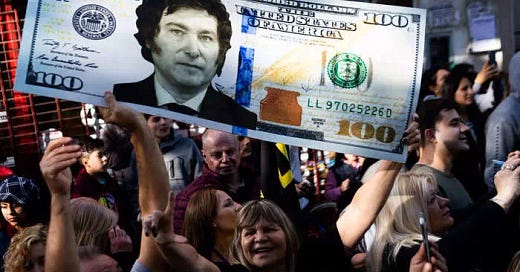Dollarization to Prevent Pauperization: Argentinian President's Bitter Prescription
Embracing Dollarization without Polarization: Argentina's Bold Economic Strategy.
Post the Presidential Election: A Tectonic Shift in Economic Policy
In the immediate aftermath of Argentina's presidential election, as explored in the previous article "Argentina's Presidential Poll: The Right Wing Soars," the country is on the verge of a sweeping economic transformation1. President-elect Javier Milei, a self-proclaimed anarcho-capitalist, has proposed a radical shift in Argentina's monetary policy: adopting the U.S. dollar as the national currency. This bold decision marks a sharp departure from traditional economic strategies and reflects an urgent response to Argentina's longstanding financial woes.
The Case for Dollarization
Argentina's Economic Turmoil
The Argentine economy, crippled by persistent inflation currently soaring to a staggering 143% — one of the highest globally — has suffered due to the continuous devaluation of its national currency, the peso. This devaluation has triggered widespread economic instability. In response, Milei proposes the dollarization of Argentina's economy, a strategy aimed at stabilizing the currency and controlling the rampant inflation. However, a significant drawback of this approach is that, upon completion of the dollarization process, Argentina would effectively relinquish all control over its monetary policy.
Challenges in Implementing Dollarization
However, the path to dollarization is fraught with challenges. Argentina's dire financial situation, characterized by limited access to global debt markets, raises questions about the feasibility of such a massive economic overhaul. Economists like Alejandro Werner, former head of the Western Hemisphere department of the International Monetary Fund, highlight the need for access to capital markets to facilitate this transition — a resource currently beyond Argentina's reach.
The Political and Legal Hurdles
Congressional Opposition and Legal Questions
Milei faces significant opposition in a divided Congress, where no single political faction holds a majority. This division poses a substantial barrier to implementing his dollarization plan. Additionally, legal challenges loom, with Supreme Court Magistrate Horacio Rosatti stating that replacing the peso with a foreign currency could be unconstitutional and a violation of national sovereignty.
The Global Context of Dollarization
Comparative Analysis with Other Nations
Globally, only a few countries, like Ecuador and El Salvador, have adopted the U.S. dollar as their national currency. While this move has brought economic stability and lower inflation to these nations, it has not automatically led to an improvement in public finances. The mixed results of dollarization in other countries serve as a cautionary tale for Argentina's ambitious plan.
The Anarcho-Capitalist Approach: A Radical Shift
Milei's Vision for Argentina's Economy
Alongside the move towards dollarization, Milei is set to implement a drastic overhaul of Argentina's government and economic framework. His strategy involves significant reductions in government expenditure, the privatization of state-controlled entities such as the oil company YPF, and the dissolution of the Central Bank, which would become largely redundant following the phase-out of the Peso in favor of dollarization. These measures are designed to free Argentina's economy from governmental constraints, reflecting Milei's commitment to an anarcho-capitalist philosophy.
Conclusion: A Future of Uncertainty and Hope
As Argentina stands at a pivotal juncture, poised for a potential seismic shift in its economic paradigm, the international community observes with keen interest. The outcome of Milei's dollarization policy will crucially determine the direction of Argentina's economic destiny and contribute significantly to the global conversation on inflation control and financial stability. While this journey is fraught with complexities and uncertainties, it harbors the potential for ushering in an era of renewed economic vigor for Argentina. However, experts caution that, despite its allure as a remedy for the nation's economic difficulties, dollarization should not be viewed as a panacea or a "silver bullet" for all challenges.
Argentina's Presidential Poll: The Right Wing Soars
Argentina's Geographical and Cultural Context Argentina, the largest country in South America after Brazil, with a population of approximately 46 million, has long been recognized in global contexts for various reasons. In India, it's often synonymous with the legendary soccer hero Diego Maradona or re…






